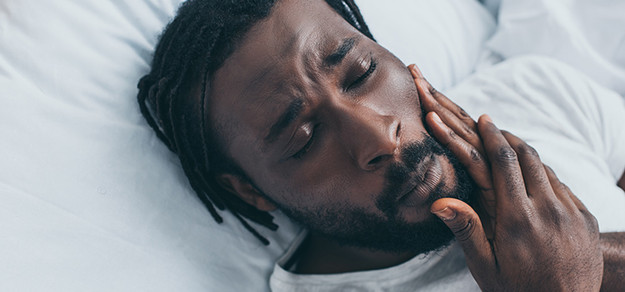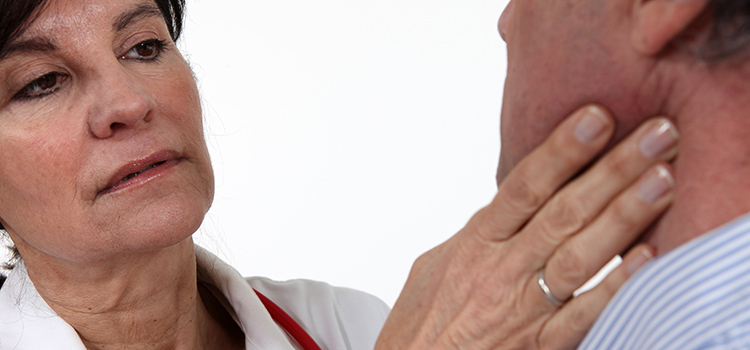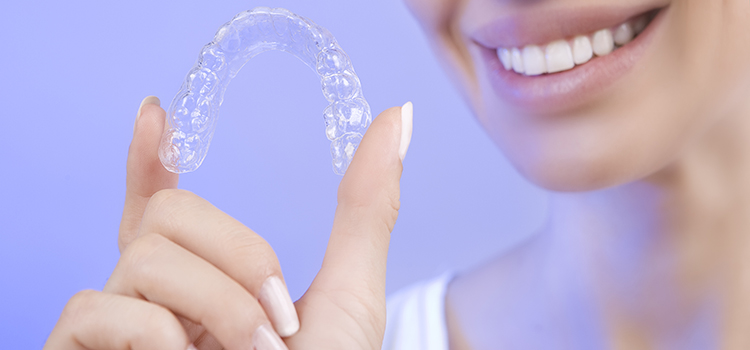Worst-Case Scenarios for Bruxism
4th Jun 2023

If you’ve been grinding your teeth at night, you may be concerned about how your symptoms could affect your oral health and quality of life. On average, people with bruxism bite down with a force six times greater than normal, and the condition can cause headaches, jaw pain, sleep disturbances, chipped teeth, and other issues that may make it hard to eat, concentrate, work, or rest. This guide will help you understand the worst-case scenarios for bruxism. We’ll cover everything you need to know about symptoms, potential complications, and treatment methods that may help.

What Worst-Case Symptoms Should I Watch For?
In the worst cases of bruxism, you may experience the following:
- Damage to your teeth or to dental restorations, including crowns
- Tension headaches
- Severe pain in your jaw joints or face
- Temporomandibular joint (TMJ) disorders
TMJ disorders, headaches, facial pain, and a sore jaw could cause concentration difficulties and sleep disruptions. The tooth damage from frequent grinding may make it painful to chew or eat.
Related Articles:
What Worst-Case Complications Could Occur With Untreated Bruxism?
When worst-case bruxism is left untreated, it can lead to issues that may compromise your dental health. For example, you may develop oral health problems that could make it difficult to eat or drink, and the appearance of your smile may be altered. In general, the complications of bruxism are caused by two factors:
- Force: Bruxism subjects the teeth and gums to prolonged, repeated, and severe force. The pressure can damage the gum tissue that supports the teeth, and this could lead to loose teeth. The excessive force from clenching may cause a tooth fracture or cracks in the teeth, and some teeth may fall out. Dental crowns, implants, or other restorations may be needed to fix the damage.
- Erosion: As the teeth are worn down by frequent grinding, the tooth enamel wears away, and the dentin is exposed. Without the protective covering of the enamel, the teeth may be extremely sensitive to hot and cold temperatures. Having sensitive teeth could make it difficult to eat ice cream, chips, and other hot, cold, or crunchy foods. In the worst cases, just feeling a bit of cold air on the tooth could cause pain. While tooth enamel can’t be replaced, treatment for bruxism could keep sensitivity from getting worse. Your dentist may be able to suggest treatments that could make your teeth less sensitive to temperatures.
In addition to tooth damage and gum issues, worst-case bruxism could lead to TMJ disorder. This condition often results in widespread jaw and upper body pain. Patients with worst-case bruxism and TMJ disorder have reported these symptoms:
- Swollen jaw: You may notice lumps in the glands of your jaw, and it might be painful to move your jaw.
- Locked jaw: This occurs when your jaw gets stuck in one position. If this happens, you won’t be able to open your mouth very far.
- Neck, shoulder, and facial pain: The pain tends to be most severe while you’re eating or talking.
If worst-case teeth grinding continues for a prolonged period, it may have an impact on your hearing. In fact, hearing loss has occurred in individuals with worst-case symptoms.

How Is Worst-Case Bruxism Treated?
Treatment for worst-case symptoms of bruxism uses a combination of behavioral modifications, medications, and dental care. Depending on your health and specific symptoms, you may be advised to try some or all of the following therapies:
- Stress management and relaxation techniques: Psychotherapy, meditation, biofeedback, and lifestyle changes could help reduce emotional stress and make it easier to relax. When you’re feeling relaxed, you may experience fewer tension headaches and worst-case symptoms of teeth grinding.
- Medications and treatment for related conditions: In some cases, clinicians may prescribe Botox, muscle relaxants, antidepressants, or anti-anxiety medicines to treat bruxism. Medications can reduce jaw clenching, muscle tension, and stress. In particular, Botox may be recommended for severe cases and worst-case symptoms that haven’t responded to other forms of treatment. If you have bruxism with sleep apnea, gastroesophageal reflux disease (GERD), or another chronic health concern, receiving treatment for these underlying conditions could reduce your bruxism symptoms.
- Diet and medication changes: When you’re dealing with teeth grinding, it’s important to avoid using caffeine and tobacco products, as these could make your symptoms more severe. Certain medicines, including fluoxetine and paroxetine, are known to trigger bruxism symptoms. Make sure to review all of your current medications with your doctor. To reduce teeth grinding, you may need to discontinue some medicines or decrease your dose.
- Wearing a night guard: A night guard protects your teeth from the damage that can be caused by teeth grinding and clenching. For example, your night guard may help you reduce the erosion of your tooth enamel, and it could prevent cracks in your teeth.
Related Articles:
What Are My Next Steps?
If you believe you may be experiencing symptoms of teeth grinding, it’s important to seek professional help as soon as possible. If bruxism is detected in the early stages, it may be possible to treat the condition with conservative treatment options, and your treatment could be more effective. See your dentist to have your symptoms evaluated.
If your dentist has advised you to wear a night guard, you may want to purchase yours from Pro Teeth Guard. We make customized night guards in a professional dental laboratory, and we use premium-quality materials. We offer a 110% money-back guarantee with every purchase.
Sources:
- Bruxism. Johns Hopkins Medicine. https://www.hopkinsmedicine.org/health/conditions-and-diseases/bruxism
- Mark, A. M. (2021). What is bruxism? The Journal of the American Dental Association, 152(9), 788. https://jada.ada.org/article/S0002-8177(21)00381-0/fulltext
- Melo, G., Duarte, J., Pauletto, P., Porporatti, A. L., Stuginski-Barbosa, J., Winocur, E., Flores-Mir, C., & De Luca Canto, G. (2019). Bruxism: An umbrella review of systematic reviews. Journal of oral rehabilitation, 46(7), 666–690. https://pubmed.ncbi.nlm.nih.gov/30993738/

- Most Popular
- Hard Outside, Soft Inside
- 2MM Thick
- Moderate / Heavy

- Most Durable
- Hard Materials
- 1.5MM Thick
- Heavy / Severe

- For Day Time Use
- Thin, Barely Visible
- 1MM Thick
- Light / Moderate

- For Clenching
- Flexible & Soft
- 1.5MM Thick
- Light / Moderate

